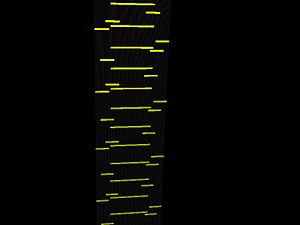SpaceElevatorRibbon
The Ribbon
The core of the Space Elevator is the physical connection between Earth and space. In our baseline design this connection is in the form of a ribbon though earlier designs discussed a round cable.
The primary technical challenge to building the Space elevator has always been the availability of material with sufficient strength. The availability and strength of this material drives all aspects of the space elevator.
| Basic Aspect | Details | |
| Material | Carbon nanotube | SWNT or MWNT two centimeters in length. General status of material see TetherDataTable.jpg also see the general file archive for this Wiki, numerous papers on CNT developments are located there |
| Width | variable | 10 cm wide in the lower atmosphere, widens to a meter at LEO and maintains this width for remainder of ribbon |
| Thickness | Ill-defined | Not a single mass, composed of axial fibers, area density in arbitrary units is 1 at LEO, 2.3 at GEO, and 10 at Earth due to width and tension requirements |
| Length | 100,000 kilometers | The length was selected based on engineering parameters such as relative mass of climber (counterweight) and cable and on the destinations of interest (Mars, asteroids). |
| Small scale design | Spun CNT thread | The number and diameter of the axial threads are yet to be determined and will be set by production limitations and ribbon robustness |
| Interconnects | Tape sandwich | Millimeter to several millimeter wide strips of gold-coated polymide tape with CNT reinforcing fibers roughly 10 microns thick. Spacing varies with the closest interconnects (10 cm) at and below LEO. Interconnects must be able to hold axial threads at 1% to 3% of their tension if broken allowing slippage at higher tension. |
These images show the proposed basic design though not completely to scale. Many small axial, load-bearing fibers are held in a ribbon configuration by orthogonal epoxy, adhesive tape or woven interconnects. increasing the size of the ribbon is accomplished by splicing additional ribbons to the sides or face of the initial ribbon.
Discussions on the ribbon can be found File:Cable write up.odt and the basic spreadsheet for cable calculations for different planets, lift capabilities, lengths, etc. can be found in this File:Cable worksheet.ods
Insert Sketchup graphic and related Sketchup file http://sketchup.google.com/3dwarehouse/details?mid=bd063afd8c6594bb86852bf1a7913ebc&prevstart=0
Major Development Issues Related to this Component
- Stored Energy Release in Ribbon
- Splicing Ribbons During Construction
- Optimizing Ribbon Design
- Atomic Oxygen Effects on Ribbon
- Spooling of the Ribbon for Deployment
- Degradation of the Ribbon in the Space Environment
- Attaching the Ribbon to the Anchor
Additional Work Needed
The ribbon is the greatest technical challenge facing the space elevator. It must be extremely strong, fault-free and damage-tolerant, lightweight, and resistant to radiation, ultraviolet and atomic oxygen.
| Item | Notes | Completed and Ongoing Efforts |
| Production of carbon nantubes | Develop techniques for mass production of CNT based materials | |
| Develop ribbon designs and optimize components | Optimize thread size for production and use, develop and test optimal interconnects (woven, tape sandwiches, epoxy,...) | |
| Make and test various ribbon designs | Aligned threads with orthogonal interconnects, cross-linked tethers (Hoytether), solid sheets... test for fault tolerance, strength to weight ratio, | |
| Test CNT threads to destruction | Test the energy storage and dissipation when a CNT thread is pulled to breaking |

